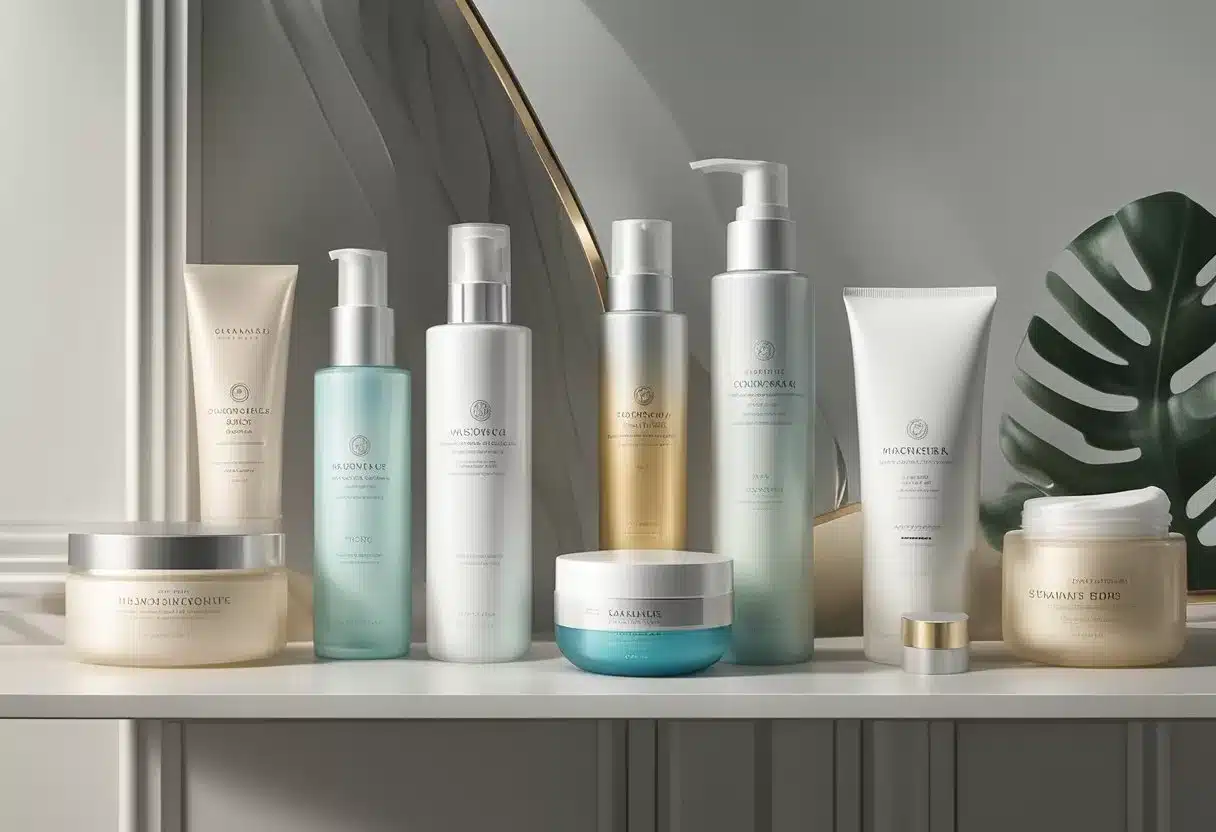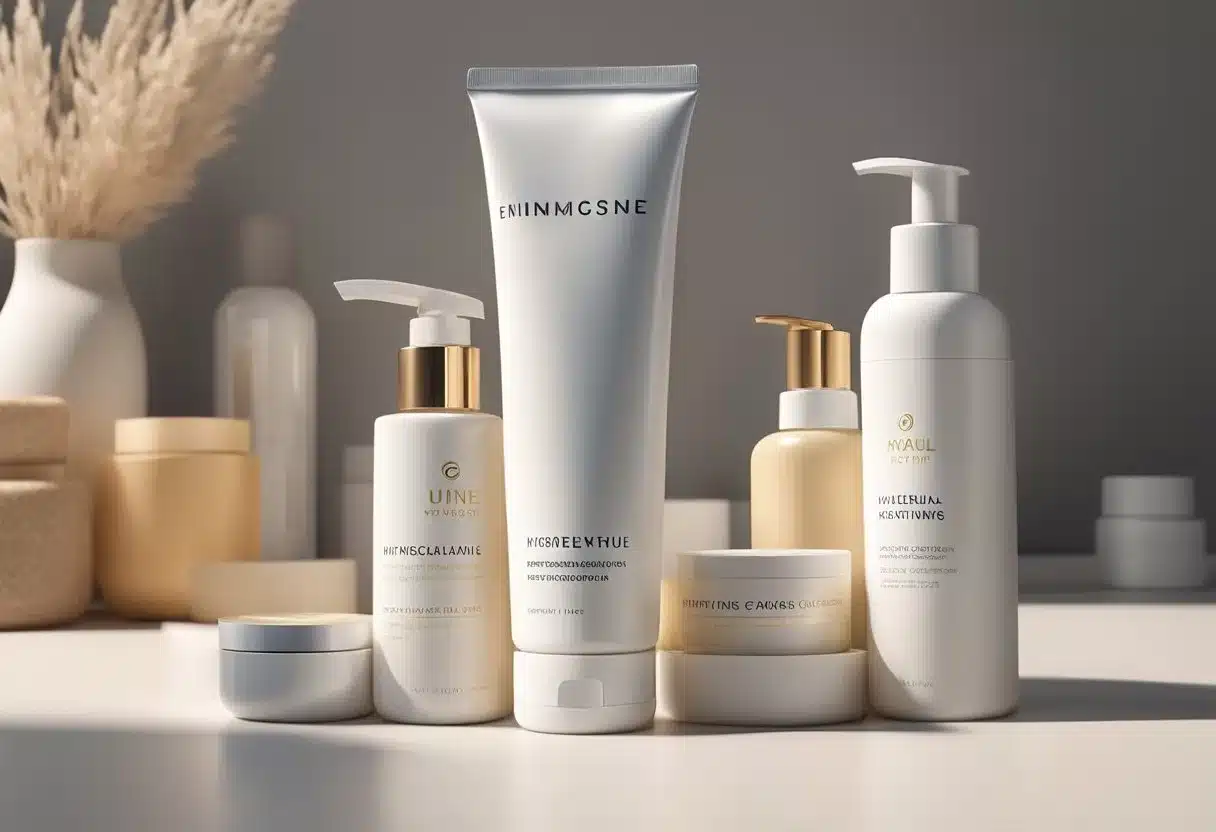A well-structured skin care routine can transform your skin and boost your confidence. Whether you're dealing with dryness, acne, or signs of aging, understanding the right steps and products is key. The correct order of skin care products can prevent irritation and ensure maximum effectiveness.

From gentle cleansers to potent serums, each product plays a vital role in maintaining healthy skin. By focusing on quality ingredients and proper application, you can tackle common skin issues effectively. Consistency and patience are essential; results take time but are worth the effort.
Sun protection should never be overlooked. Sunscreen helps prevent premature aging and protects against harmful UV rays. Making it a daily habit can significantly improve your skin's health and appearance.
Key Takeaways
- Correct product order prevents irritation.
- Quality ingredients matter in treating skin issues.
- Daily sunscreen use is essential for sun protection.
Understanding Your Skin

Understanding your skin is key to creating an effective skincare routine. Different people have different skin types, which can affect how their skin looks and feels.
Skin types include oily, dry, and sensitive skin. Each type requires different care.
Skin Types
- Oily Skin: Produces excess oil, leading to a shiny appearance and potential acne. Products that control oil and reduce shine are helpful.
- Dry Skin: Lacks moisture and can feel tight or flaky. Keeping it hydrated with moisturizers is important.
- Sensitive Skin: Easily irritated by products or conditions. Gentle, fragrance-free items are ideal.
Complexion and Skin Concerns
A person's complexion can vary from light to dark and might have various skin concerns:
- Acne: Common in oily skin, often requiring products with salicylic acid.
- Redness: Usually seen in sensitive skin, calmed by soothing ingredients.
- Uneven Tone: Can occur in all skin types, often treated with brightening products.
Tips for All Skin Types
- Cleansing: Essential for all skin types to remove dirt and oil. Use a gentle cleanser that suits your skin type.
- Moisturizing: Prevents dryness and balances oily skin. Choose a non-comedogenic moisturizer.
- Sunscreen: Protects all skin types from UV damage. Look for broad-spectrum and SPF 30 or higher.
Understanding these aspects helps in choosing the right products and building a routine that keeps your skin healthy and glowing.
Cleansing Fundamentals

Cleansing is crucial to clear skin as it removes makeup, dirt, and debris. Understanding makeup removal, choosing the right cleanser, and proper techniques like toning and exfoliation can enhance your skincare routine.
First Steps: Makeup Removal
Removing makeup is the initial step in any effective cleansing routine. Using a quality makeup remover ensures all traces of mascara, foundation, and other products are lifted off the skin. Micellar water is a popular option due to its ability to attract and dissolve makeup without harsh rubbing. For heavy or waterproof makeup, an oil-based remover is more effective.
Key Points:
- Use micellar water for light makeup.
- Opt for oil-based removers for waterproof products.
- Gently wipe to avoid skin irritation.
Choosing the Right Cleanser
Selecting a cleanser tailored to your skin type is essential. For oily skin, gel cleansers work best to remove excess oil without over-drying. Those with dry skin benefit from cream or lotion cleansers that add moisture. Combination skin may require a balanced formula. It’s important to avoid cleansers with harsh chemicals that can strip the skin’s natural oils.
Skin Type Tips:
- Oily Skin: Gel cleansers.
- Dry Skin: Cream or lotion cleansers.
- Combination Skin: Balanced formulas.
The Role of Toning
Toning helps to remove any residual cleanser and prepares the skin for further products. Toners can tighten pores and balance the skin's pH. Those with oily skin can benefit from toners containing salicylic acid. Alcohol-free toners are gentle on dry or sensitive skin. Incorporating a toner can enhance skin clarity and texture.
Exfoliation Techniques
Exfoliation is important for removing dead skin cells. There are two main types: physical and chemical. Physical exfoliants use small grains or brushes. Chemical exfoliants use acids like AHA or BHA. Exfoliate 1-2 times weekly to prevent over-exfoliation. Regular exfoliation can improve texture and promote a brighter complexion.
Types of Exfoliants:
- Physical: Scrubs and brushes.
- Chemical: AHA and BHA based products.
Advanced Cleansing: Double-Cleansing Method
Double-cleansing involves two cleansing steps. First, an oil-based cleanser dissolves makeup and sunscreen. Second, a water-based cleanser removes any remaining impurities like dirt and debris. This method is effective for thorough cleansing without stripping the skin of its natural oils. It's suitable for all skin types, especially those who wear heavy makeup.
Common Cleansing Questions
Q: How often should one cleanse their face?
A: Twice daily, morning and night.
Q: Can over-cleansing damage the skin?
A: Yes, it can strip natural oils and disrupt the skin barrier.
Q: Should a cleanser be used even without makeup?
A: Yes, to remove dirt, oil, and environmental pollutants.
Understanding and properly following these cleansing fundamentals can significantly improve skin health and appearance.
Treating Skin Concerns
Effectively treating specific skin concerns involves targeted approaches. From acne breakouts to aging signs, each issue requires specific care routines and products to achieve the best results.
Acne and Breakouts
Acne and breakouts can be challenging to manage, but effective treatments typically include salicylic acid and benzoyl peroxide. These ingredients help to unclog pores and reduce inflammation. Spot treatments are also useful for targeting individual pimples. Acne-prone skin benefits from non-comedogenic products to prevent pore clogging.
Aging and Fine Lines
To address aging signs like fine lines and wrinkles, ingredients like retinol and collagen-boosting agents are key. Retinol helps increase skin cell turnover, which minimizes fine lines. Antioxidants like vitamin C and vitamin E protect the skin from free radical damage. Products with these ingredients can help maintain youthful skin texture.
Pigmentation and Dark Spots
Dark spots and hyperpigmentation are often treated with vitamin C serums and other brightening agents. Vitamin C helps to lighten dark spots and even out skin tone. Ingredients like niacinamide and hydroquinone can also be effective in reducing pigmentation. Consistent application of these products aids in fading dark spots over time.
Sensitivity and Redness
For those with sensitive skin and redness, gentle and soothing formulations are essential. Green tea and aloe vera are calming ingredients that can reduce irritation. Board-certified dermatologists often recommend using products free from fragrances and harsh chemicals to minimize skin reactions. Glycerin is beneficial for moisturizing without causing irritation.
Hydration and Dryness
Dry skin needs intense hydration. Hyaluronic acid is an excellent hydrating agent, capable of holding up to 1000 times its weight in water. Moisturizing regularly with products containing glycerin and ceramides helps maintain the skin’s moisture barrier. Using a hydrating serum under moisturizer can provide extra hydration.
Oil Control
Managing oily skin involves using products that control sebum production without stripping the skin of its natural oils. Salicylic acid is effective for reducing oiliness and preventing acne. Lightweight, oil-free moisturizers that contain ingredients like niacinamide can help balance oil production while keeping the skin hydrated.
Science-Based Skin Care
Science-based skin care ensures that products and routines are backed by scientific research. Dermatologists and esthetician-approved products often contain clinically tested ingredients. Retinol, hyaluronic acid, and vitamin C are examples of scientifically supported ingredients that deliver results.
Eye Area Care
The skin around the eyes is delicate and requires special attention. Eye creams with ingredients like peptides, hyaluronic acid, and vitamin C can help reduce dark circles and fine lines. Consistent use of a hydrating eye cream can improve the appearance of the eye area, making it look refreshed and youthful.
Moisturizing and Hydration

Moisturizing and hydration are essential for keeping the skin supple and healthy. Understanding how to select and layer products, and addressing specific concerns, can significantly improve the effectiveness of your routine.
Selecting the Right Moisturizer
Choosing the right moisturizer is crucial for any skin care routine. Look for products containing hyaluronic acid and ceramides. Hyaluronic acid helps retain moisture, while ceramides restore the skin barrier. For those with oily skin, lightweight, oil-free moisturizers work best. Dry skin types should opt for richer creams that provide intense hydration.
Reading labels can help identify beneficial ingredients like niacinamide, which is known for its anti-inflammatory properties. The moisturizer should be applied after cleansing and toning, before other treatments, to ensure it locks in moisture effectively.
The Importance of Eye Creams
The skin around the eyes is delicate and prone to fine lines and wrinkles. Incorporating an eye cream into your routine can help address these issues. Eye creams are specially formulated to hydrate this sensitive area and often include ingredients like hyaluronic acid and niacinamide.
For best results, apply eye cream twice daily. Gently tap a small amount around the orbital bone, avoiding the eyelids. This practice not only hydrates but can also reduce puffiness and dark circles, enhancing the overall appearance of the skin.
Serums and Special Treatments
Serums and spot treatments are designed to deliver concentrated ingredients to the skin. They are typically applied after cleansing and toning but before moisturizing. Serums with hyaluronic acid can boost hydration levels, while those containing niacinamide can help with inflammation and redness.
For targeted concerns like dark spots or acne, use specific serums or treatments. Apply them directly to the problem areas, and follow with your regular moisturizer. Using these products consistently can lead to noticeable improvements in skin texture and appearance.
Nighttime Moisturizers and Creams
The nighttime routine is an opportunity to use richer products without the interference of makeup or sun exposure. Night creams often contain ceramides, hyaluronic acid, and sometimes retinoids for skin renewal. These ingredients work together to repair and hydrate skin overnight.
Apply the night cream as the last step in your evening routine. This ensures that all other products have time to absorb and that the cream can form a barrier to lock in moisture. Consistent use can lead to softer, more hydrated skin by morning.
Layering Products Correctly
Layering skin care products correctly is essential for maximizing their effectiveness. The rule of thumb is to apply products from thinnest to thickest consistency. Start with serums, followed by eye creams, and finish with a moisturizer or night cream.
If incorporating face oils or essences, apply oils last to seal in the moisture. Essences, which are usually lighter, can be applied after toning but before serums. This layering ensures that each product can penetrate the skin and perform its function effectively.
Specific Concerns: Oils and Essences
Oils and essences address specific skin care needs and can be added to the routine for extra hydration and nourishment. Face oils like argan or jojoba oil are excellent for dry skin, providing a layer of protection against moisture loss. Apply them after your regular moisturizer.
Essences are lightweight and help boost hydration. They often contain hyaluronic acid and are applied after toning but before serums. These products can enhance the absorption of subsequent products and ensure the skin remains hydrated throughout the day.
Sun Protection and Prevention

Using sunscreen daily and understanding UV protection are vital steps in any skin care routine to prevent issues like skin cancer, sunburn, and wrinkles.
Daily Sunscreen Use
Applying sunscreen every day is one of the simplest ways to protect the skin. Dermatologists recommend using a broad-spectrum sunscreen with at least SPF 30. This type of sunscreen protects against both UVA and UVB rays, which can cause skin cancer and early aging signs like wrinkles and age spots.
For best results, apply face sunscreen to all exposed skin about 15 minutes before going outside. Don't forget areas like the neck, ears, and hands. Reapply every two hours, or more often if swimming or sweating. Even on cloudy days, UV rays can reach the skin, so it's important to make sunscreen a regular part of your routine.
Understanding UV Protection
UV protection is essential to prevent skin damage from the sun’s harmful rays. UVB rays cause sunburn and are the main contributor to skin cancers. UVA rays, which penetrate deeper into the skin, lead to premature aging, such as wrinkles and hyperpigmentation.
To ensure full protection, look for sunscreen labeled "broad-spectrum," which shields against both UVA and UVB rays. Adding a hat, sunglasses, and wearing protective clothing can also help. For those with skin concerns like hyperpigmentation, using UV protection can prevent these issues from worsening. By being mindful of sun exposure and consistently using protection, skin health is better maintained.
For more details, check out this sun protection guide.
Skincare Routine Structuring

A well-structured skincare routine is essential for achieving healthy, glowing skin. Following specific steps and using the right products for your skin type is crucial. Morning and evening routines serve different purposes, and adjustments are necessary as your skin ages.
Morning Skincare Routine
A morning skincare routine should focus on protection and hydration. Start with a gentle cleanser to remove impurities. Follow with a toner to balance the skin's pH. Apply a light serum with antioxidants like vitamin C. Use a moisturizer suitable for your skin type. Finish with sunscreen having at least SPF 30 to protect against UV rays.
Steps:
- Cleanser
- Toner
- Antioxidant Serum
- Moisturizer
- Sunscreen
Evening Skincare Routine
The evening routine aims at repair and rejuvenation. Begin with a makeup remover or cleansing oil to dissolve makeup. Follow with a gentle cleanser. Apply a toner, then a treatment product like retinol or an AHA/BHA serum. Use a rich moisturizer to keep the skin hydrated overnight. An eye cream can help reduce fine lines and puffiness.
Steps:
- Makeup Remover/Cleansing Oil
- Cleanser
- Toner
- Treatment (Retinol/AHA/BHA)
- Moisturizer
- Eye Cream
Routine for Different Skin Types
Dry Skin
- Morning: Hydrating cleanser, toner, hydrating serum, rich moisturizer, sunscreen
- Evening: Makeup remover, gentle cleanser, hydrating toner, night cream, eye cream
Oily Skin
- Morning: Foaming cleanser, toner, lightweight serum, oil-free moisturizer, sunscreen
- Evening: Makeup remover, foaming cleanser, toner, treatment for acne, lightweight moisturizer
Combination Skin
- Morning: Gentle cleanser, toner, hydrating serum, balanced moisturizer, sunscreen
- Evening: Makeup remover, gentle cleanser, toner, treatment (targeting oily areas), balanced night cream
The Order of Application
Applying products from thinnest to thickest consistency ensures maximum effectiveness. Start with lightweight products like essences and serums. Follow with heavier creams and oils. Sunscreen is always last in the morning routine, while night creams finish the evening routine.
Order for the face:
- Cleanser
- Toner
- Essence
- Serum
- Eye Cream
- Moisturizer
- Sunscreen (Morning)
Adjusting Your Routine with Age
As you age, your skin's needs change. Incorporate anti-aging products like retinoids and peptides. Hydration becomes more critical, so use richer moisturizers and serums. Regular exfoliation helps to remove dead skin cells and improve skin texture.
Consistency is Key
Consistency is vital for any skincare routine. Using products daily, both morning and night, ensures optimal results. Changing routines frequently can lead to skin irritation. Stick to products for at least 4-6 weeks to see noticeable improvements.
Professional Advice and Customization
Consulting with a board-certified dermatologist or esthetician can help tailor a routine to your specific needs. Professional advice ensures you're using the right products and techniques. Customizing your routine based on professional guidance maximizes effectiveness and prevents skin issues. For more detailed guidance, consider Allure's beginner tips.
Ingredients and Formulations

The effectiveness of any skin care routine often hinges on the proper application and combination of specific ingredients. Understanding the roles and benefits of these components is crucial for achieving healthy skin.
Understanding Active Ingredients
Active ingredients are crucial in skin care routines as they directly address skin concerns such as acne, aging, and hydration. Common active ingredients include retinoids, which promote cell turnover, and vitamin C, known for its brightening and antioxidant properties. Hyaluronic acid is another key ingredient, attracting moisture to the skin to enhance hydration. Choosing the right active ingredients based on your skin type and concerns is essential for optimal results.
Peptides and Proteins
Peptides and proteins like collagen play a significant role in skin health. Peptides are small chains of amino acids that help build proteins in the skin. Copper peptides are popular for their anti-aging benefits, aiding in wound healing and collagen production. Protein formulations can enhance skin's firmness and elasticity, reducing the appearance of fine lines and wrinkles.
Vitamins and Antioxidants
Vitamins such as vitamin C and vitamin E are potent antioxidants that protect skin from free radicals. Vitamin C helps brighten and even skin tone, while vitamin E offers moisturizing and healing properties. Green tea extracts are also rich in antioxidants, helping fight inflammation and reduce signs of aging. Combining these vitamins can enhance their protective and healing effects on the skin.
Natural Oils and Extracts
Natural oils like argan oil, jojoba oil, and rosehip oil are rich in essential fatty acids and antioxidants. These oils nourish and hydrate the skin, making them suitable for dry and sensitive skin types. Botanical extracts, such as green tea and chamomile, provide soothing and anti-inflammatory benefits. These natural ingredients are often preferred in formulations for their gentle and effective skin care properties.
Chemical Exfoliants and Acids
Chemical exfoliants like salicylic acid and glycolic acid are essential for removing dead skin cells and promoting cell turnover. Salicylic acid penetrates deep into pores, making it effective for treating acne. Glycolic acid, derived from sugar cane, helps brighten the skin and reduce fine lines. These acids need to be used correctly to avoid irritation, particularly for sensitive skin.
Preservatives and Fragrance
Preservatives are essential in skin care products to prevent microbial growth and extend shelf life. Common preservatives include parabens and phenoxyethanol. Fragrances, while adding pleasant scents, can cause irritation or allergic reactions for some people. Opting for fragrance-free products can be beneficial for those with sensitive skin or allergies, ensuring minimal irritation.
Retinoids and Their Derivatives
Retinoids, including retinol, are vitamin A derivatives used for their powerful anti-aging properties. They promote cell turnover and collagen production, which helps reduce wrinkles and improve skin texture. Retinoids can be potent, so starting with lower concentrations and gradually increasing can help minimize irritation. Prescription retinoids are available for more severe skin concerns.
Hydration Boosters
Hydration boosters like hyaluronic acid and glycerin are vital for maintaining skin moisture. Hyaluronic acid holds up to 1,000 times its weight in water, making it incredibly effective for hydrating the skin. Glycerin attracts moisture from the environment and into the skin, improving hydration and elasticity. These ingredients are suitable for all skin types, especially dry and dehydrated skin.
Healthy Habits and Lifestyle

Staying hydrated is crucial for clear and healthy skin. Drinking plenty of water helps to flush out toxins and keep the skin moisturized from the inside out. Aim for at least eight glasses of water a day.
A balanced diet rich in fruits, vegetables, and whole grains supports skin health. Antioxidant-rich foods like berries, nuts, and spinach can protect the skin from damage. Avoiding excessive sugar and processed foods can also be beneficial.
Getting enough rest is essential. Sleep allows the skin to repair and rejuvenate, reducing the appearance of dark circles and puffiness. Aim for 7-9 hours of sleep each night for optimal skin health.
Exercise increases blood flow, which helps to nourish skin cells and keep them vital. Regular physical activity can contribute to a healthy glow by delivering oxygen and nutrients to the skin. It also helps to manage stress, which can reduce acne flare-ups.
Incorporating these healthy habits into daily life can improve skin health and appearance. For further tips, check out this Mayo Clinic guide on skin care.
Avoid smoking as it can damage the skin and speed up aging. If you need help quitting, consult a healthcare professional for advice and support.
When to See a Professional

If your skin issues persist despite following a consistent skincare routine, it might be time to see a board-certified dermatologist. Persistent acne, severe dryness, or unusual skin reactions are indicators to seek professional help.
Chronic Skin Conditions
Conditions like eczema, psoriasis, or severe rosacea often require treatment from a dermatologist. They can provide targeted medications or therapies that may not be available over-the-counter.
Moles and Skin Growths
If you notice new moles or changes in existing ones, schedule an appointment. A dermatologist can check for signs of skin cancer or other serious issues.
Persistent Acne
For acne that doesn't improve with traditional treatments, a dermatologist can prescribe stronger medications. This can include oral antibiotics or topical treatments.
Severe Allergic Reactions
Experiencing severe rashes or allergic reactions to skincare products is a reason to consult a professional. They can help identify triggers and recommend appropriate treatments.
Anti-Aging Concerns
For concerns about fine lines, wrinkles, or age spots, dermatologists offer a range of treatments. These include chemical peels, laser therapies, and prescription creams.
Hair and Scalp Issues
Issues like hair loss or scalp dermatitis might need specialized care. Dermatologists are trained to handle these conditions effectively.
Consistent and professional advice is crucial for serious or persistent skin concerns. For more information on skincare routines and recommendations, consider reviewing this dermatologist-recommended guide.
Frequently Asked Questions

This section provides clear and detailed answers about essential skincare steps, adapting routines for glowing skin, gender differences in skincare, and how to handle specific skin types like oily and dry skin.
What are the essential steps in a daily skincare routine?
A daily skincare routine typically includes cleansing, moisturizing, and applying sunscreen. Cleansers help remove dirt and oil, moisturizers hydrate the skin, and sunscreen protects against UV damage. For deeper care, you might also use toner and serum.
How can I adapt my skincare routine for glowing skin?
To achieve glowing skin, consider adding vitamin C serum and exfoliating regularly. Vitamin C brightens the skin, while exfoliation removes dead skin cells, revealing fresher skin underneath. Both steps help enhance skin radiance and clarity.
What are the key differences in skincare routines for men?
Men's skincare routines often focus on shaving needs and may use different formulations. Cleansers for men might be more robust to address tougher skin and more active oil glands. Moisturizers can also include soothing agents for post-shave care.
How should I adjust my skincare routine for oily skin?
For oily skin, use a gentle foaming cleanser and choose oil-free, non-comedogenic moisturizers. Incorporate products with salicylic acid to help control excess oil and prevent breakouts. Avoid heavy creams and lotions that can clog pores.
Which products are crucial for a complete skincare regimen?
Key products include a cleanser, toner, serum, moisturizer, and sunscreen. Cleansers remove impurities, toners balance the skin's pH, serums target specific concerns, moisturizers hydrate, and sunscreens protect against sun damage. Each product plays a unique role in maintaining healthy skin.
What routine should I follow for dry skin to maintain moisture?
For dry skin, focus on hydration. Use a gentle, hydrating cleanser and follow with a rich moisturizer, preferably containing hyaluronic acid or ceramides. Apply moisturizers while the skin is still damp to lock in moisture. Adding a hydrating serum or oil can also help.